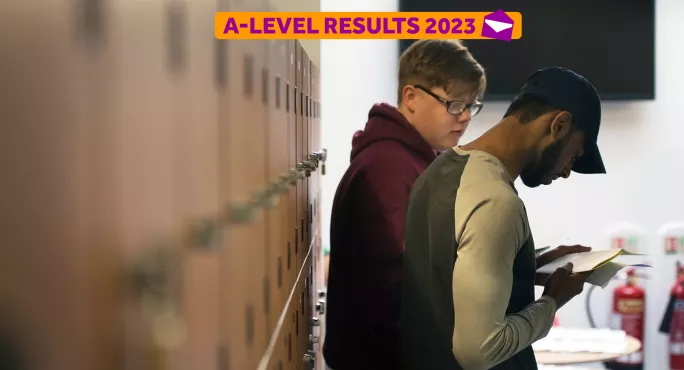
A-level results 2023: Wider gap ‘down to lack of catch-up cash’

The widening regional divide in today’s A-level results is a consequence of the government failing to invest enough money in catch-up following the Covid pandemic, a headteachers’ leader has said today.
Concerns have been raised that today’s results show that the regional variation in outcomes has increased compared with 2019, with the gap in top grades being achieved in the North of England and the South having widened.
Geoff Barton, general secretary of the Association of School and College Leaders, said the disproportionate impact of Covid on disadvantaged students had affected today’s results.
He told Tes: ”Sadly, but not surprisingly, this appears to be reflected in the discrepancies we can see in the results of students from different geographical regions, and in different types of school or college.
“This is the consequence of the government not investing anything like enough in education catch-up, and the failure of their broader economic and levelling-up strategies.”
- Results: 2023 A-level results in full
- Wales: A-level attainment falls in 2023
- A levels: Teacher tips for results day
As the government had planned, the spread of grades this year has been brought far closer to that of 2019, compared with any of the past three Covid disrupted years.
In two of the three regions in the North - The North East and Yorkshire and the Humber - the proportion of A*/A grades was down on 2019 (the last set of A-level exam results before the pandemic).
In the other seven English regions this figure increased.
A-level results show inequality has widened
Lee Elliot Major, professor of social mobility at the University of Exeter, said the results have “confirmed our greatest fears - education inequalities have widened in the post-pandemic era, and social mobility has taken a backward step”.
He told Tes that some parts of the country are at risk of becoming “segregated and ghettoised” if the gap is allowed to continue widening.
“We need a long-term - five- to 10-year - education strategy which looks at the whole system, which calls for more investment, or those who are entitled will continue to achieve at a higher level and some areas will become more segregated and ghettoised.
“To address that we need to get the curriculum right: is it too narrow and academic? How do we assess children and how do you hold a school to account?”
He added that the government was wrong to celebrate increasing numbers of students on free school meals entering university because “it is merely a sign of the rising tide of child poverty”.
Sam Tuckett, associate director at the Education Policy Institute, said the drop in grades in the North was a concern.
“The falling outcomes in parts of northern England, where disadvantage levels are higher on average, may be the result of the unequal impact of the pandemic on different groups of students,” he said. But he added that further investigation was needed to clarify this.
Data released by Ofqual this morning also shows that nationally around one in 10 students in England were awarded an E or U (unclassified) this year, amid concerns that students took A levels they might not have been qualified for after receiving inflated GCSE results in 2021 from teacher-assessed grades.
Jonny Uttley, chief executive of the Education Alliance academy trust, said students at his schools had received “good results for us” but warned that the widening disadvantage gap could have been partly caused by inflated teacher-assessed grades (TAGs) at GCSE.
“I think we can say that TAGs delivered results across the system which were significantly higher than typical exam grades, and that this will have resulted in some pupils doing A levels who might not have done so in pre-pandemic years. And I think we can also surmise that these pupils will be concentrated in comprehensive state schools sixth-forms and not in independent schools or in hyper-selective state sixth-forms,” he added.
The proportion of A*/A grades awarded to private school A-level entries was up by 2.6 percentage points for exams sat this summer, at 47.4 per cent compared with 44.8 per cent in 2019.
Barnaby Lenon, chair of the Independent Schools Council, said there was “no doubt that schools in disadvantaged areas have been disproportionately affected by Covid”.
He added: “For the independent and grammar sectors to have done well is no surprise given the social make-up of these schools, where the impact of Covid on disruption of learning was less.
“Independent schools were very quick to offer lessons online during lockdown when we saw unions discouraging members from teaching online. Therefore the impact of lockdown was reduced in the independent sector.”
Keegan suggests A-level results will become irrelevant
There has been some controversy today around comments made by education secretary Gillian Keegan, who said in an in interview with Sky News that people “won’t ask you anything about your A-level grades in 10 years’ time”.
In response, Labour’s shadow education secretary, Bridget Phillipson, said: “I think the comments from the secretary of state are incredibly rude and dismissive. This is a nerve-racking day for young people who’ve worked incredibly hard.”
You need a Tes subscription to read this article
Subscribe now to read this article and get other subscriber-only content:
- Unlimited access to all Tes magazine content
- Exclusive subscriber-only stories
- Award-winning email newsletters
- Unlimited access to all Tes magazine content
- Exclusive subscriber-only stories
- Award-winning email newsletters
You need a subscription to read this article
Subscribe now to read this article and get other subscriber-only content, including:
- Unlimited access to all Tes magazine content
- Exclusive subscriber-only stories
- Award-winning email newsletters
- Unlimited access to all Tes magazine content
- Exclusive subscriber-only stories
- Award-winning email newsletters
topics in this article



